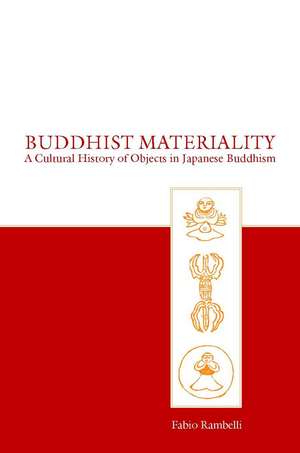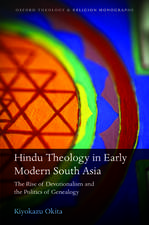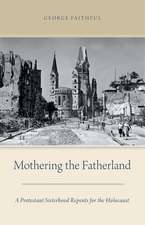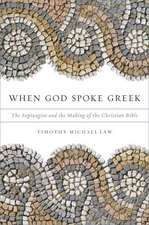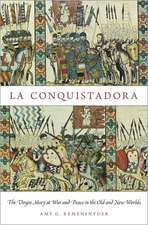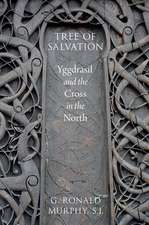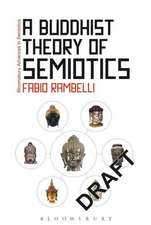Buddhist Materiality: A Cultural History of Objects in Japanese Buddhism: Asian Religions and Cultures
Autor Fabio Rambellien Limba Engleză Hardback – 14 noi 2007
Throughout its history, Buddhism has developed a sophisticated philosophy of materiality, addressing the status of material objects and their role in the quest for salvation. This is an innovative book that addresses the ways in which Buddhism has conceived of, and dealt with, material objects ranging from the environment to everyday tools, ritual implements, icons, and sacred texts. Contrary to received assumptions, careful reading of original sources and study of ritual practices show that in Buddhism the realm of materiality is not simply an obstacle for spiritual pursuits but also a space for interplay in which human beings can give shape and expression to their deepest religious and spiritual ideas.
Preț: 483.27 lei
Preț vechi: 596.63 lei
-19% Nou
Puncte Express: 725
Preț estimativ în valută:
92.47€ • 96.81$ • 76.52£
92.47€ • 96.81$ • 76.52£
Carte tipărită la comandă
Livrare economică 07-21 aprilie
Preluare comenzi: 021 569.72.76
Specificații
ISBN-13: 9780804756822
ISBN-10: 0804756821
Pagini: 408
Dimensiuni: 156 x 235 x 30 mm
Greutate: 0.72 kg
Editura: Stanford University Press
Colecția Stanford University Press
Seria Asian Religions and Cultures
ISBN-10: 0804756821
Pagini: 408
Dimensiuni: 156 x 235 x 30 mm
Greutate: 0.72 kg
Editura: Stanford University Press
Colecția Stanford University Press
Seria Asian Religions and Cultures
Recenzii
"...the reader's effort will be amply rewarded with insightful analysis of fascinating materials that have yet to receive much scholarly attention. Specialists in Buddhist studies, Japanese religions, and material culture will likely get the most out of this book, but I would also enthusiastically recommend it to anyone interested in closely documented and theoretically sophisticated examination of the interrelations between religion, culture, society, politics, and the material objects that populate people's lives."—Stuart H. Young, Religious Studies Review
"Rambelli has written an altogether seminal study of East Asian Buddhist material culture and its importance to especially Japan's social worlds. This is the stuff of life, and Rambelli handles it expertly."—Pamela Winfield, H-Net Reviews.
"The broad and ambitious scope of this study warrants praise...This is an extraordinary volume whose impact will be felt for some time."—James L. Ford, Journal of Japanese Studies.
"Rambelli's Buddhist Materiality will exert long-lasting influence in a number of fields, including Buddhist studies, Japanese religions, Japanese history, and material culture studies."—Lori Meeks, The Journal of Religion
"Buddhist Materiality, a powerful study in seven chapters....[The book] represents a provocative and important contribution to the field of Japanese studies, Buddhist studies and material religion."—Barbara Ambros, Material Religion.
"Rambelli displays considerable erudition, shows great familiarity with primary texts, and presents much material not otherwise available to readers of English. Especially valuable are his discussions of the Japanese understandings of 'nature' (which term he unpacks at length), myths and rituals that sacralize tools and professions, and rituals of thanking (and retiring) tools. More particularly, the author argues convincingly that the Buddhist origins of such attitudes and practices have been undervalued by past scholarship." —CHOICE
"Rambelli's book offers us new lenses to see what had been hidden in plain sight." —Monumenta Nipponica
"Rambelli displays considerable erudition, shows great familiarity with primary texts, and presents much material not otherwise available to readers of English. Especially valuable are his discussions of the Japanese understandings of 'nature' (which term he unpacks at length), myths and rituals that sacralize tools and professions, and rituals of thanking (and retiring) tools. More particularly, the author argues convincingly that the Buddhist origins of such attitudes and practices have been undervalued by past scholarship." —CHOICE
"Rambelli's book offers us new lenses to see what had been hidden in plain sight." —Monumenta Nipponica
Notă biografică
Fabio Rambelli is Professor of Japanese Religions and Cultural History and International Shinto Foundation Chair of Shinto Studies in the Department of East Asian Languages and Cultural Studies Department of Religious Studies, University of California, Santa Barbara.
Descriere
This innovative book shows that throughout its history, contrary to received assumptions, Buddhism developed a sophisticated philosophy of materiality—one that allowed human beings to give shape and expression to their deepest religious and spiritual ideas.
